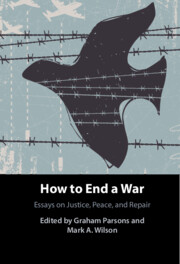Book contents
- How to End a War
- How to End a War
- Copyright page
- Contents
- Contributors
- Acknowledgments
- Introduction
- Chapter 1 The Lament of the Demobilized
- Chapter 2 Moral Injury and Moral Failure
- Chapter 3 Stoic Grit, Moral Injury, and Resilience
- Chapter 4 Political Humiliation and the Sense of Replacement
- Chapter 5 Minimum Moral Thresholds at War’s End
- Chapter 6 Ending Endless Wars
- Chapter 7 Forever Wars
- Chapter 8 Two Conceptions of the Proportionality Budget for Jus Ex Bello
- Chapter 9 Toward a Post Bellum Lieber Code
- Chapter 10 Reconciliation Is Justice – and a Strategy for Military Victory
- Bibliography
- Index
Chapter 6 - Ending Endless Wars
Published online by Cambridge University Press: 02 March 2023
- How to End a War
- How to End a War
- Copyright page
- Contents
- Contributors
- Acknowledgments
- Introduction
- Chapter 1 The Lament of the Demobilized
- Chapter 2 Moral Injury and Moral Failure
- Chapter 3 Stoic Grit, Moral Injury, and Resilience
- Chapter 4 Political Humiliation and the Sense of Replacement
- Chapter 5 Minimum Moral Thresholds at War’s End
- Chapter 6 Ending Endless Wars
- Chapter 7 Forever Wars
- Chapter 8 Two Conceptions of the Proportionality Budget for Jus Ex Bello
- Chapter 9 Toward a Post Bellum Lieber Code
- Chapter 10 Reconciliation Is Justice – and a Strategy for Military Victory
- Bibliography
- Index
Summary
Over the past few decades, it has become increasingly difficult for major powers to translate battlefield victories into favourable political outcomes. As a result, US military engagements in the Middle East, Russian engagements in its “near abroad” and in Syria, French engagements in sub-Saharan Africa, and the African Union’s war in Somalia have turned into protracted missions with little prospect of decisive victory. This chapter examines the phenomenon of “endless war,” asking why it has become so difficult to bring wars to an end and what can be done about it. It shows that the problem is global, rooted in the changing nature, purposes, and attitudes of war. As wars become less about resolving disputes between states and more about the internal composition of states, and as those contests become ever more internationalized, the capacity of actors to sustain war have increased while incentives to pursue peace have declined. The first part examines the “endless war” thesis that grounds the problem in US liberal hegemony. The second part offers a brief explanation of factors that extend a war’s duration and inhibit peace. The third discusses how these issues might be addressed.
- Type
- Chapter
- Information
- How to End a WarEssays on Justice, Peace, and Repair, pp. 111 - 131Publisher: Cambridge University PressPrint publication year: 2023

